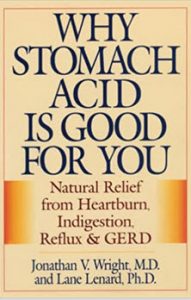

The stomach is probably the most misunderstood organ in the body. If you’ve ever experienced heartburn, you’re probably thinking the stomach is too acidic and causing discomfort. However, heartburn is not caused by stomach acid but from poorly digested foods that backflow into the esophagus. It’s a combo of food and some stomach juices, and the esophagus wasn’t meant for the acidic substance, so it burns – consequently heartburn.
The stomach is all about the acid. The normal pH of stomach acid is from 1.5-3.0, and when there’s not enough acid in the stomach, carbohydrates ferment (and not in a good way), proteins will putrefy, and fats will become rancid. Sounds delightful, right?
The use of antacids and acid blockers raises the pH of the stomach’s contents to a neutral pH, and guess what, your digestion was just messed up. Now you have the opportunist organisms like bacteria, yeast, viruses, parasites, etc., to feed on the poorly digested foods that will continue to head south where additional dysfunction can occur.
If you don’t believe me, here is a small experiment you can try at home. A fellow practitioner did this experiment at an elementary school to educate the kids about the importance of healthy digestion. The kids were fascinated with the result of grossness.
- Make 1 extra portion at dinner, meat, potatoes, veggies, desert
- Throw it in the blender
- Add ½ cup of water.
- Spit in it (yes, I said spit in it)
- Blend it up
- Find someplace warm to set it (98.6 degrees)
- See how long it takes to get disgusting.
The outcome of this experiment is what happens to the food in your stomach if you’re not producing enough stomach acid.
Digestion is a north-to-south process. Dysfunction begins in the brain. As a culture, we’re constantly placing stress on our sympathetic nervous system. To digest our food, our parasympathetic nervous system needs to be in a chilled-out state, which means slowing down, taking time to enjoy our food, chewing well, and just RELAX while eating.
If you don’t take the time to chew your food correctly (~30 seconds), the brain doesn’t get the message to trigger the proper digestive process. As a result, the production of saliva isn’t activated. A quick minute on saliva…. saliva is a complex mixture of electrolytes, hormones, and enzymes. Salivary amylase begins the chemical breakdown of starches. If this enzyme isn’t secreted, the breakdown of carbohydrates doesn’t start. The pancreatic enzyme amylase cannot complete the breakdown of starch in the small intestine leaving undigested starch entering the colon.
And guess what? All this feeds candida, creating general dysfunction further down the digestive tract.
So, what happens if you don’t produce enough stomach acid? First, our first line of defense against yeast, prions, bacteria, virus, and parasites are gone. When stomach pH is correct, pepsin digests these microorganisms…essentially, they become food. When the pH is not right, an environment is created in which these organisms thrive and raise havoc on the GI tract.
How do you correct low stomach acid? I’m glad you asked. Drinking lemon water when you wake up will kick start the production of stomach acid. Also, taking a high-quality HCI (hydrochloric acid) supplement with meals with the caveat it needs to be appropriately taken to avoid discomfort effectively. I suggest reading Why Stomach Acid is Good for You – Natural Relief from Indigestion, Reflux & GERD by Johnathan V. Wright, M.D. and Lane Lenard, Ph.D.
Proper digestion is the pathway to great health. All illnesses can be traced back to dysfunction in our digestion. As I mentioned, digestion is a north-to-south process, and it all starts in the brain with the sight and smell to start the salivary glands producing the enzymes for when the food hits our tongue. So we all know where digestion ends up. However, so much happens in between that affects our other foundations or health pillars. Blood sugar regulation, mineral balance, fatty acid balance, and hydration. All these foundations or pillars of health sit on a properly prepared, nutrient-dense diet.

Excellent article, Pat! Thank you for this common sense approach to wellness.